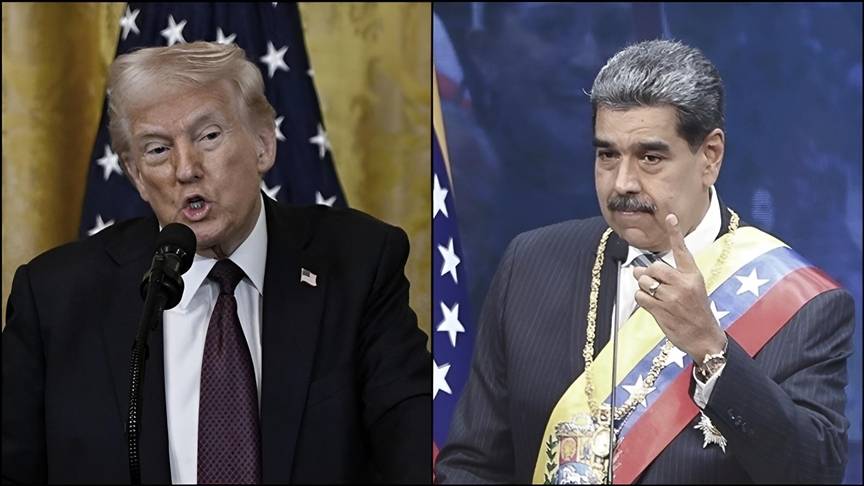1880 Views
Washington’s \$50 Million Gamble: Why Regime Change in Venezuela Is a Losing Game
In recent years, the United States’ aggressive foreign policy toward Nicolás Maduro’s government in Venezuela has intensified, with regime change as its central focus. These policies, rooted in the first Trump administration, have involved economic sanctions, military pressure, and judicial accusations. The ultimate goal of this approach has been the removal of Maduro and the establishment of a government aligned with Washington’s interests.
Direct Pressure on Venezuela’s Leadership
One of the most striking aspects of Trump’s policy was the direct targeting of Venezuela’s leadership. In March 2020, during the final year of his first term, the U.S. Department of Justice indicted Nicolás Maduro and several senior Venezuelan officials on charges of terrorism, drug trafficking, and corruption. The indictment was accompanied by a \$15 million reward for information leading to Maduro’s arrest.
This move went beyond diplomacy or legal maneuvering—it was a clear political statement that Washington’s ultimate aim was not negotiation or reform, but the physical or judicial removal of Venezuela’s leader. The strategy was designed to strip Maduro of international legitimacy and create divisions among his loyalists. In practice, however, it united government supporters against “American imperialism,” allowing Maduro to exploit the situation to consolidate his domestic power.
Now, five years later, in the first year of Trump’s second term, he has escalated measures further, raising the bounty on Maduro’s capture to \$50 million.
The Military Option as Leverage
Alongside legal and economic pressure, the Trump administration used military pressure as a psychological tool. The deployment of warships and U.S. military forces to the Caribbean Sea, near Venezuela’s shores, under the banner of “counter-narcotics operations,” was a signal to Caracas that the military option was on the table.
Although many analysts believed a direct military strike was unlikely due to its heavy political and human costs, the mere U.S. presence in the region created an atmosphere of threat and uncertainty. This strategy sought to intimidate Venezuela’s military elites and push them to abandon Maduro. Yet, the threats failed to produce significant fractures in Venezuela’s armed forces and instead served mainly to satisfy Washington’s domestic hardliners.
Humanitarian Consequences of Sanctions and the Migration Crisis
The heaviest and most tangible aspect of U.S. policy was the imposition of crippling economic sanctions, especially against Venezuela’s state oil company. These sanctions cut off the government’s main source of revenue, pushing an already fragile economy into near-total collapse.
While the stated aim of the sanctions was to pressure Maduro’s government, the real victims were ordinary Venezuelans. Shortages of food, medicine, and basic services forced millions to leave the country, triggering one of the largest migration crises in the Western Hemisphere.
The migration crisis directly affected neighboring countries and even the U.S., with increased flows of asylum seekers at America’s southern border. This unintended consequence highlighted a glaring contradiction in Trump’s policy: while his administration championed hardline immigration measures, its actions in Venezuela exacerbated a crisis that spilled into U.S. borders.
Internal Divisions and Lack of a Coherent Strategy
Despite its aggressive appearance, U.S. policy toward Venezuela under Trump was marked by deep internal divisions. On one side, hardliners such as Senator Marco Rubio pushed for harsher measures and even military intervention. On the other, some officials within the State Department and Pentagon warned of the unpredictable consequences of military action and emphasized diplomatic solutions.
This rift produced mixed signals and a lack of a consistent long-term strategy. While public rhetoric focused on regime change, limited and behind-the-scenes talks also occurred—but these often collapsed under domestic political pressure. As a result, Washington’s ability to build an effective international coalition against Maduro was undermined.
Regional Resistance to Intervention
U.S. interventionist policies met broad resistance across Latin America. Countries such as Brazil, Mexico, and Argentina opposed any form of military action or regime change led by Washington. This regional opposition is deeply rooted in the region’s history of U.S. interventions, including Cold War-era coups. Without regional support, achieving regime change would be difficult and costly.
Organizations like the Organization of American States (OAS) have attempted to promote diplomatic approaches as alternatives to military pressure, but Washington often disregarded such proposals. This resistance risks pushing the U.S. into deeper isolation in Latin America.
The Potential Consequences of Military Conflict
Analysts warn that a military conflict in Venezuela could have catastrophic consequences. Such an intervention would not only risk sparking a long and bloody civil war but could also escalate into a transregional crisis. A U.S. military move might intensify tensions with Maduro’s strategic allies, such as Russia and China, both of which have significant economic and military stakes in Venezuela.
Domestically, engaging in a new war could prove politically and economically unsustainable for the U.S., fueling a deep crisis in its domestic politics and further polarizing its society.
Conclusion
The United States’ aggressive policy toward Maduro’s government in Venezuela represents a classic case of a failed strategy. By combining crippling economic sanctions, military threats, and direct targeting of a national leader, Washington not only failed to achieve its primary goal of regime change but also deepened instability and human suffering in Venezuela.
This approach was weakened by internal divisions in Washington and met with firm regional opposition in Latin America. The main lesson for the future is that resolving complex political crises like Venezuela’s cannot be achieved through blind sanctions and military threats, but only through inclusive diplomacy, support for international dialogue, and respect for national sovereignty.
Translated by Ashraf Hemmati from the original Persian article written by Mohammad Saleh Ghorbani

Comment
Post a comment for this article